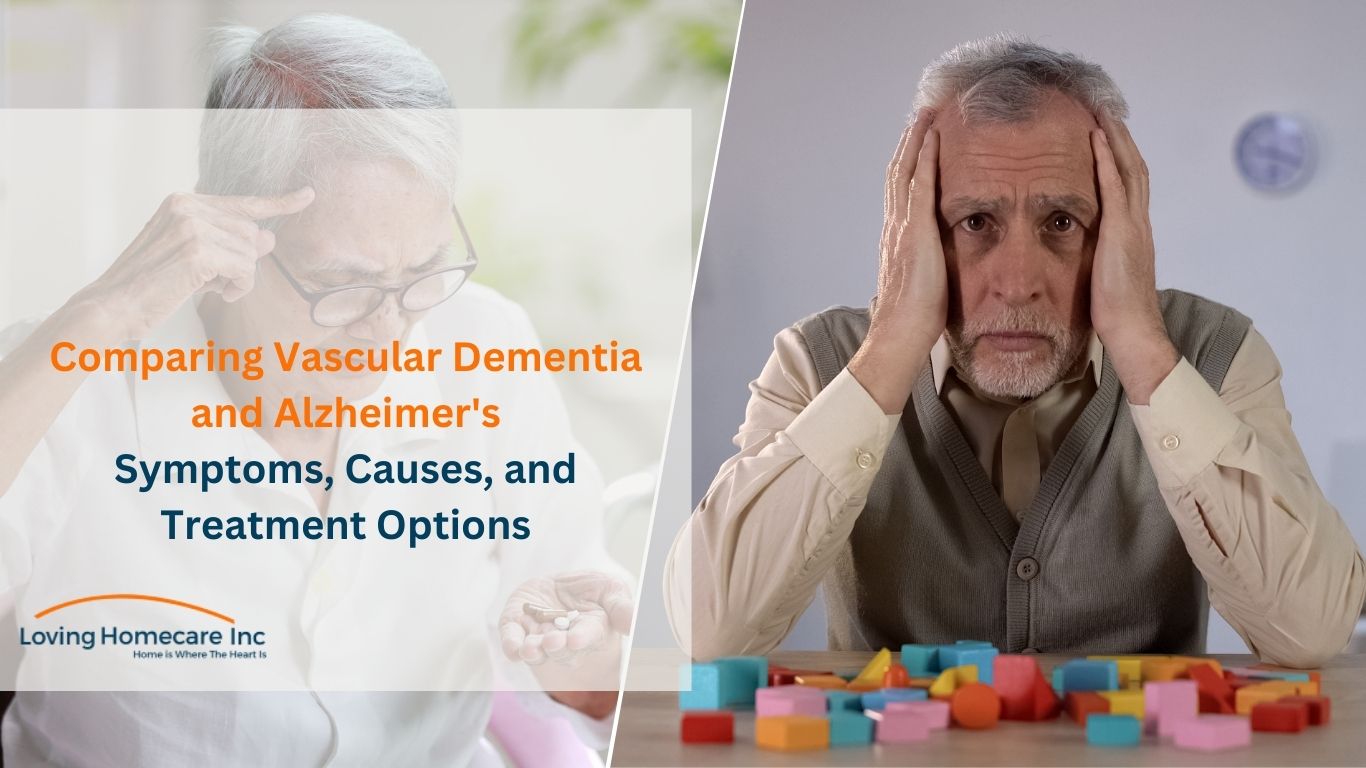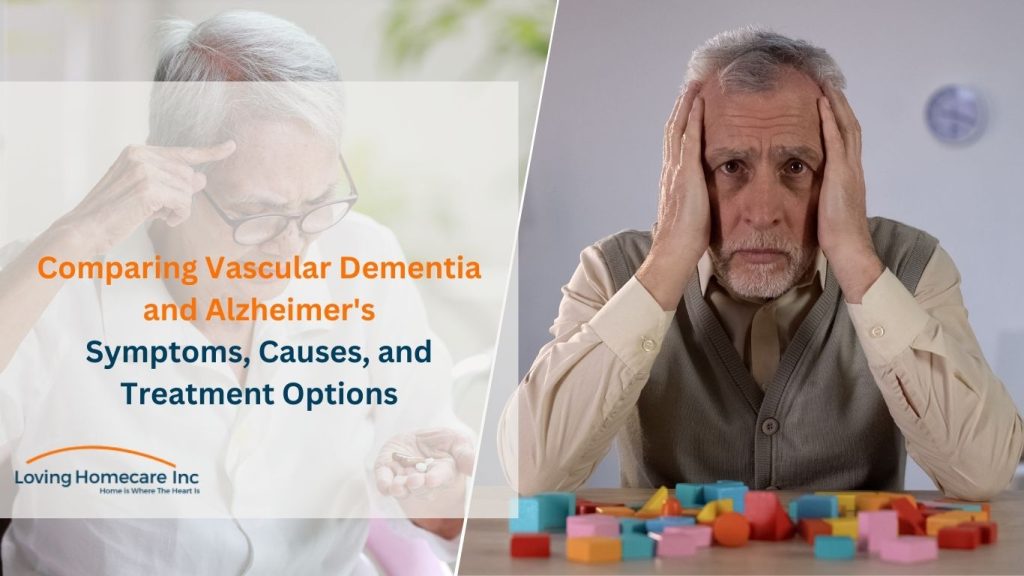Recently updated on January 20th, 2026 at 10:01 am
 Dementia is a syndrome marked by a significant decline in cognitive functions, which impairs daily activities and quality of life. It encompasses a range of neurological conditions, with Alzheimer’s disease and vascular dementia being the most common types.
Dementia is a syndrome marked by a significant decline in cognitive functions, which impairs daily activities and quality of life. It encompasses a range of neurological conditions, with Alzheimer’s disease and vascular dementia being the most common types.
Alzheimer’s is typically noted for its gradual onset and progressive worsening of memory and cognitive functions. On the other hand, vascular dementia often arises more suddenly, linked to vascular issues that impair blood flow to the brain, such as after a stroke.
Both conditions profoundly affect millions worldwide, necessitating ongoing research and improved treatment methods. Their prevalence underscores the importance of understanding the distinctive mechanisms and symptoms associated with each, to better support affected individuals and their families.
Here is everything you need to better understand the debate between vascular dementia vs Alzheimer’s:
Alzheimer’s disease: A Gradual Decline in Cognitive Health

Alzheimer’s disease represents a significant challenge in the realm of cognitive health, characterized by its slow onset and progressively debilitating nature. This common form of dementia gradually erodes an individual’s memory and cognitive abilities due to pathological changes within the brain. Key among these changes is the accumulation of amyloid plaques and tau tangles, which are hallmarks of the disease.
- Amyloid Plaques: These are dense deposits of protein and cellular material that accumulate outside and around neurons. They disrupt cell function by blocking communication between brain cells and triggering inflammatory responses, which ultimately damage cells.
- Tau Tangles: Tau proteins support the transport system within neurons. In Alzheimer’s, these proteins become abnormally twisted and tangled, which hampers nutrient and information flow within cells, leading to cell death.
The symptoms of Alzheimer’s disease manifest gradually and vary in severity as the disease progresses:
- Memory Loss: Initially, this might appear as minor forgetfulness, particularly of recent conversations or events. As the disease progresses, memory loss becomes more pronounced and debilitating.
- Language Problems: Individuals may struggle with vocabulary, finding it difficult to name objects or understand conversations.
- Disorientation: People with Alzheimer’s often lose track of dates, seasons, and the passage of time. They may become lost in previously familiar settings.
- Behavioral Changes: As the brain cells deteriorate, significant changes in personality and behavior can occur. This might include mood swings, social withdrawal, distrust in others, irritability, and aggression.
As Alzheimer’s advances, the symptoms become more severe, often resulting in the need for full-time care. This gradual worsening not only impacts the individuals suffering from the disease but also places a heavy emotional and financial burden on families and caregivers.
Vascular Dementia: Cognitive Impairment Linked to Blood Flow Issues

Vascular dementia is a serious form of cognitive impairment that results from problems with blood flow to the brain. Unlike Alzheimer’s disease, which develops gradually, vascular dementia can begin suddenly and often progresses in noticeable steps downward after each subsequent stroke or vascular incident. This form of dementia is primarily caused by conditions that disrupt cerebral circulation, such as strokes or chronic cardiovascular diseases.
- Cerebral Strokes: A major stroke can lead to significant brain damage, and minor strokes might also impair cognitive abilities. Each stroke event has the potential to further deteriorate mental function, depending on the area of the brain affected.
- Chronic Cardiovascular Issues: Conditions like heart disease, diabetes, and hypertension can narrow or block arteries, reducing blood flow to the brain and gradually leading to cognitive decline.
The symptoms of vascular dementia vary based on the severity and location of blood flow disruption in the brain:
- Cognitive Challenges: There is often a marked decline in the ability to organize thoughts, solve problems, and plan effectively. Individuals may experience confusion and difficulty concentrating on tasks.
- Physical Symptoms: Since vascular dementia may be caused by stroke, physical symptoms such as weakness or paralysis on one side of the body are common. These symptoms can be particularly distressing as they also affect mobility and daily functioning.
- Mood Fluctuations: Emotional instability is frequent, with individuals displaying rapid mood swings and depressive symptoms due to the brain’s impaired ability to regulate emotions.
The abrupt onset and progression of vascular dementia make it crucial for medical intervention to focus not only on alleviating symptoms but also on preventing further vascular damage. Controlling risk factors like high blood pressure, cholesterol, and diabetes is essential for slowing the progression of the disease.
Comparing Symptoms of Alzheimer’s and Vascular Dementia
While both Alzheimer’s and vascular dementia are types of cognitive decline, they present distinct patterns of symptoms that reflect their different underlying causes. Understanding these differences is crucial for accurate diagnosis and appropriate management.
Alzheimer’s Disease:
- Memory Loss: Alzheimer’s typically begins with very subtle changes in memory, especially short-term memory loss. This includes forgetting conversations, appointments, or where items were placed.
- Language Difficulties: Individuals may struggle with finding the right words during conversations or may substitute incorrect words, making it hard to understand their language.
- Disorientation: Patients often lose track of time and place, which can lead to confusion about even familiar environments.
- Personality Changes: Mood and behavior changes are common, such as increased irritability, depression, or withdrawal from social activities.
Vascular Dementia:
- Reasoning and Planning: Damage to the brain’s ability to manage critical thinking tasks can lead to noticeable problems with reasoning, complex task management, and following instructions.
- Physical Symptoms: Physical impairments like weakness or paralysis often occur, especially if the dementia follows a stroke. These symptoms typically appear suddenly.
- Rapid Cognitive Decline: Unlike the gradual decline seen in Alzheimer’s, vascular dementia may lead to abrupt changes in cognitive abilities following each new stroke or cardiovascular event.
- Mood Swings: Emotional instability may be more pronounced due to the sudden changes in brain function.
These differences underscore the need for tailored approaches to each type of dementia, taking into account the specific symptoms and progression patterns.
Diagnosis of Alzheimer’s and Vascular Dementia

Diagnosing Alzheimer’s and vascular dementia involves a combination of medical evaluation, cognitive testing, and imaging technologies to accurately differentiate between these conditions.
General Diagnostic Tools:
- Medical History: A detailed medical history helps to identify the pattern of memory loss or cognitive decline and any family history of similar symptoms.
- Cognitive Tests: These assessments measure memory, planning, language, and the ability to perform familiar tasks, highlighting areas affected by cognitive impairment.
Specific Tools for Alzheimer’s:
- Neuroimaging: MRI, CT, and PET scans, now enable earlier and more accurate diagnosis of Alzheimer’s by detecting amyloid plaques and tau tangles, supporting tailored interventions and slower disease progression.
- Genetic Testing: combined with neuroimaging, facilitates early diagnosis and personalized treatment plans for Alzheimer’s, optimizing care based on individual genetic profiles to improve efficacy and safety.
Specific Tools for Vascular Dementia:
- Cardiovascular Health Assessment: Evaluating the health of the heart and blood vessels is crucial, as these factors are closely linked to brain health. This includes monitoring blood pressure, cholesterol levels, and other indicators of cardiovascular disease.
- Brain Scans: Imaging studies not only look at the structure of the brain but also at the blood flow, helping to identify any blockages or areas of reduced circulation that could be causing symptoms.
The correct diagnosis of Alzheimer’s or vascular dementia not only helps in understanding the progression of the disease but also significantly aids in making informed treatment decisions, which can greatly improve the quality of life for those affected.
Beyond traditional methods, recent innovations like AI-powered predictive analytics and digital cognitive health tools are revolutionizing early detection. These technologies can identify subtle changes in behavior or cognition through continuous monitoring, leading to timely interventions and better management of dementia symptoms.
Treatment Options for Alzheimer’s and Vascular Dementia
Alzheimer’s Disease:
- Cholinesterase inhibitors: help boost memory-related chemicals, and are now often integrated with pharmacogenomics—personalized medicine that optimizes medication regimens to minimize adverse effects and enhance response for older adults.
- NMDA receptor antagonists: Aim to slow down the progression of symptoms. You can opt for Alzheimer’s care Los Angeles ca and other regions offer.
Vascular Dementia:
- Managing underlying conditions: is crucial, with modern approaches including wearable devices for real-time blood pressure and ECG monitoring, enabling proactive risk assessment and early intervention for vascular dementia patients.
- Focused cardiovascular care: Treatments target heart and arterial health to improve overall cerebral circulation. Opt for dementia care services for optimum healthcare.
In today’s evolving healthcare landscape, there is a strong shift toward personalized, home-based care supported by technology. Telehealth services, smart home devices like automated medication dispensers, and wearable sensors for fall detection allow patients to age in place safely, reducing hospitalizations and enhancing independence while providing peace of mind for families.
The Importance of Lifestyle Changes and Early Diagnosis

For both Alzheimer’s and vascular dementia, lifestyle modifications and early diagnosis are critical for effective management.
Adopting a healthier diet, rich in antioxidants and low in processed foods, is now supported by digital lifestyle modification programs that provide remote coaching and monitoring, improving adherence and outcomes for dementia prevention.
Regular physical activity improves blood flow and brain function, while quitting smoking reduces the risk of vascular problems that can exacerbate dementia symptoms. Early diagnosis is crucial as it allows for timely intervention, potentially slowing the disease’s progression.
It also enables better planning and support, helping patients and families manage the challenges of dementia more effectively, enhancing quality of life and prolonging independence.
FAQs:
Conclusion:
Understanding the distinct causes, symptoms, and progression paths of Alzheimer’s and vascular dementia is crucial for proper diagnosis and treatment. While both conditions share the common feature of cognitive decline, their management strategies differ significantly, reflecting their unique underlying causes.
If you or a loved one is facing challenges associated with dementia or Alzheimer’s, consider reaching out to Loving Homecare. Our team of professionals specializes in dementia and Alzheimer’s care, providing tailored support to enhance the quality of life for those affected. Contact Loving Homecare today to ensure compassionate and expert care for your loved ones.

